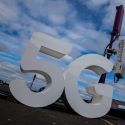
Also in today's EMEA regional roundup: Orange promotes startups and more in Russia and Senegal; ADVA's Q3 hit by US trade policy; Deutsche Telekom defends its smart speaker set-up.
The GSMA, which lobbies on behalf of the mobile industry, is bracing itself for a battle with Europe over the use of millimeter-wave (mmWave) spectrum for 5G services. The group is anticipating a potential clash at next week's World Radiocommunication Conference in Egypt over the use of mmWave, which some European authorities argue interferes with "space services" such as satellite-based weather-sensing. In a statement, Brett Tarnutzer, head of spectrum at the GSMA, said: "We are calling for Europe to join the US in taking a pro-5G stance at WRC-19 to protect its digital future. Some administrations are still determined to limit mobile use of airwaves that 5G requires to reach its full potential. This protectionist attitude will have consequences for our global economy if allowed to prevail."
Orange is taking its Fab "accelerator" program to Russia, allowing technology startups in Putin's kingdom to apply to take part in pilots relating to artificial intelligence, big data analytics, the Internet of Things, next-generation networks and cloud technologies. Startups who think they might be in with a shout will be able to apply via the accelerator's website.
Meanwhile, in sunnier climes, Orange is opening its second Digital Center on the African continent, in Dakar, Senegal. A 2,000 square meter facility over six floors, the Center brings a number of Orange-led programs together under one roof, including the aforementioned Orange Fab, a coding school and the Orange Digital Ventures investment fund.
Germany's ADVA is partly blaming US trade policy for the slump in its third-quarter net income, from €3.9 million (US$4.3 million) in the year-ago period to €2.2 million ($2.4 million) this time around. Revenues for the period were up 14.4%, to €144.3 million ($160.5 million).
Anacom, the Portuguese telecom regulator, has decided to hold its 5G spectrum auction between April and June next year, Reuters reports. The timing, says the regulator, aligns with the European Commission's stated aim of launching 5G services in all European Union (EU) member states by the end of 2020.
Deutsche Telekom has been trying to set the story straight on how and where data from its own smart speakers is processed. According to Deutsche Telekom, a report in Handelsblatt, the German daily, gave the impression that data from the speakers was being processed outside the EU, thereby running a potential security risk. In its statement, Deutsche Telekom says this report "is not correct. No data is processed outside Europe. Unfortunately, the wording of our privacy notices is somewhat misleading. We are therefore revising this wording in order to make it even more comprehensible, because access from non-EU countries is only granted in very exceptional cases for maintenance purposes of the technical platform." The operator also maintains that, contrary to what Handelsblatt said, the opt-out process -- which allows users to say no to the use of their smart speaker-derived data -- is "very transparent."
Despite heavily promoted efforts to get down with the kids through the introduction of streaming services for both audio and video content, the BBC, Britain's taxpayer-funded public broadcaster, is in real danger of losing the youth audience. That, at least, is the conclusion of a report by Ofcom, the UK's telecom regulator. Among its findings: Less than half (49%) of young people aged 16-24 tuned into BBC TV channels in an average week; people aged 16-34 spent an average of one hour and 12 minutes with the BBC every day -- five minutes less than the previous year; and BBC iPlayer's reach of 15-24 year olds fell from 28% to 26%, while Netflix saw its younger audience increase from 56% to 66%. In terms of catch-up services, the Beeb may have some catching up to do.
— Paul Rainford, Assistant Editor, Europe, Light Reading
Read more about:
EuropeAbout the Author(s)
You May Also Like











